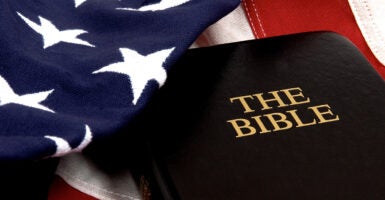In this year’s presidential election, 32 million self-identified Christians who regularly attend church are unlikely to vote, according to a recent study released by Arizona Christian University.
The Oct. 7 study said that enthusiasm among that cohort is lower for the November elections because of “the public’s distaste for both major-party candidates,” Republican former President Donald Trump and Democratic Vice President Kamala Harris.
But a separate report from Rice University’s Baker Institute for Public Policy released in mid-September by Michael O. Emerson says otherwise.
According to the latter report, Christian voters are going to play an outsized role in the U.S. election and that they will have a greater impact than ever before.
Groups like the Policy Circle, a nonpartisan, grassroots organization, are working toward that end by boosting civil discourse and civic engagement.
At the Policy Circle’s Faith and Civic Life Symposium on Sept. 30, Virginia Gov. Glenn Youngkin extended “an invitation” to Americans to get more involved in politics.
The Virginia Republican governor said Americans should find their “lily pad”—their unique spot where they can fully engage with what is right and wrong with well-informed voices. One of these “lily pads” can be a faith-based organization.
Americans should not accept the notion that there’s no place for faith-based organizations in government, Youngkin said.
Sarah Parshall Perry, a senior legal fellow at The Heritage Foundation, said people who are part of faith-based organizations, such as pregnancy resource centers or ministry-based preschools in churches, have the opportunity to go out and vote their values.
“They have the opportunity to rectify that through the work that they do with conservative—and often ministry-based—organizations,” she said.
Many people are feeling hopeless, Perry said, and that “may be informing right now that large contingent of evangelicals who don’t want to go to the ballot box.”
“For those individuals who are voting, I believe they recognize the seriousness of this cultural Rubicon and the recognition of what exactly is at stake, and in very simple terms, for people who are evangelicals, they must absolutely know that this election may be the difference of their ability to practice their faith in public life or not,” she said. “And that is a very, very, powerful incentive for these individuals to go to the ballot box come November.”































